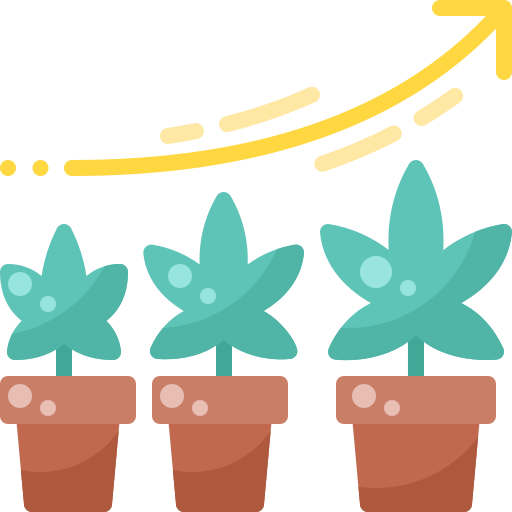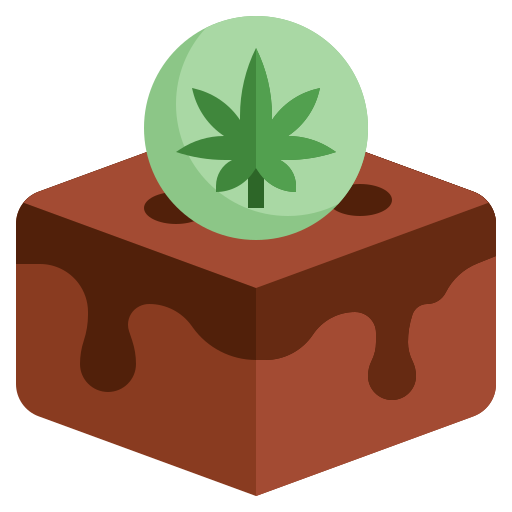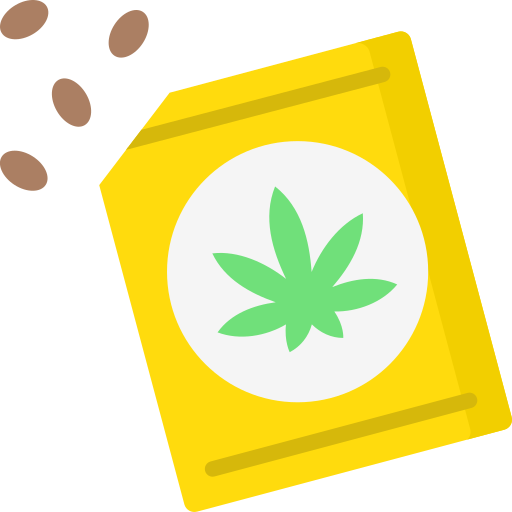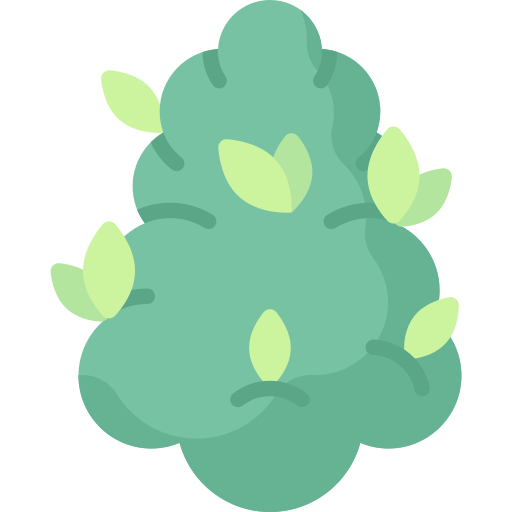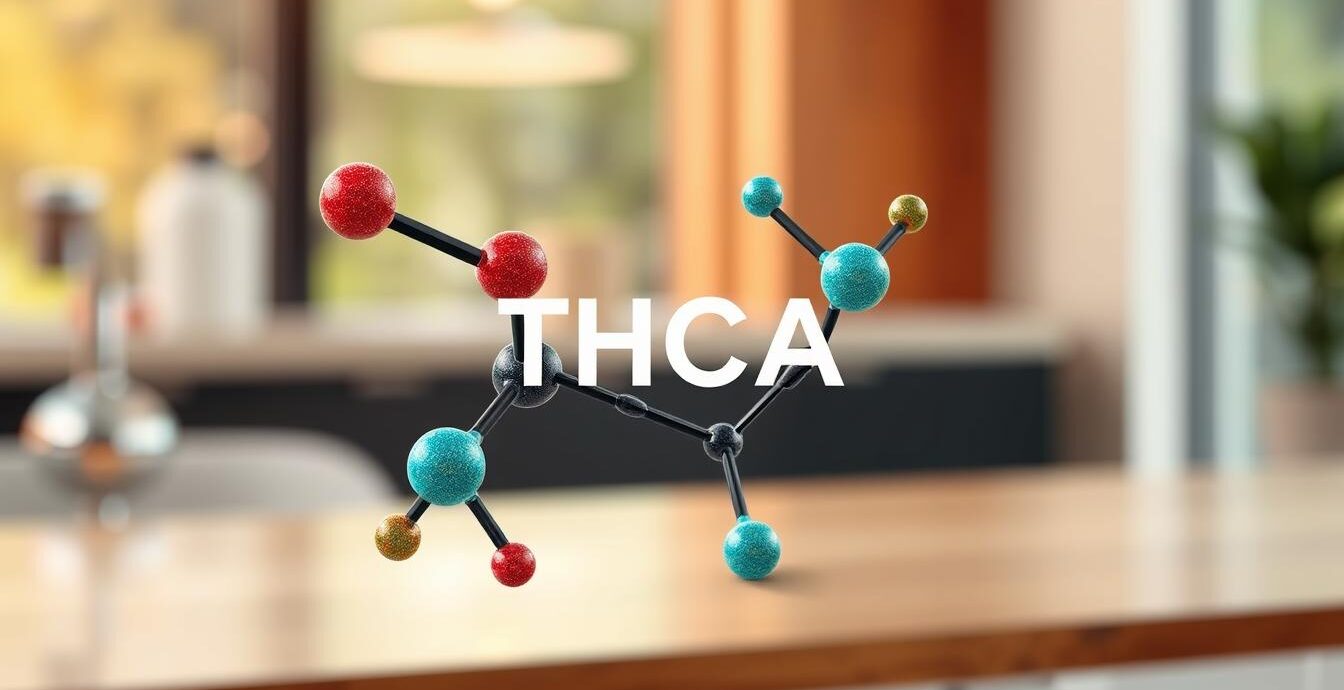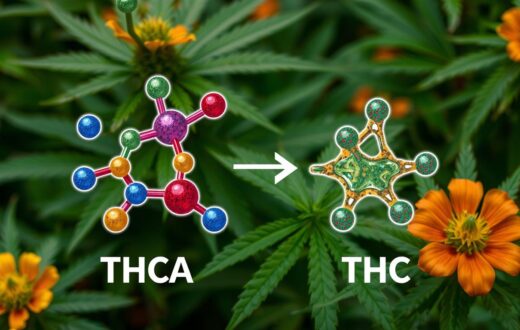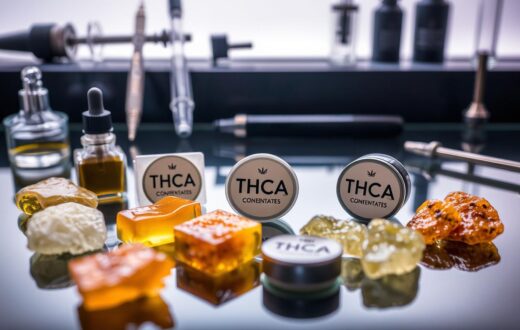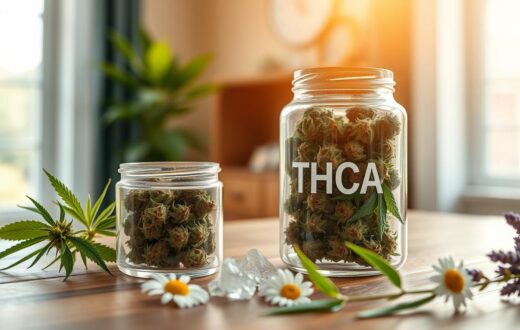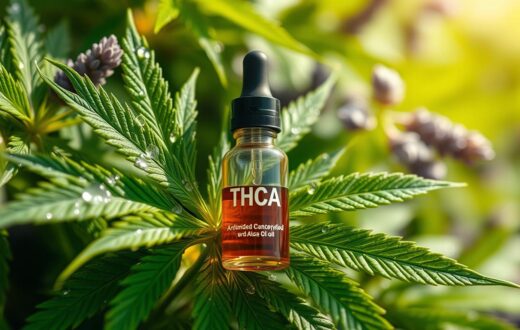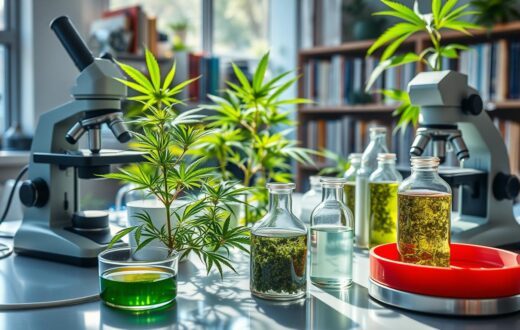Ever wondered about cannabis’s hidden powers? THCA is a fascinating compound that’s changing how we see the plant. This guide explores THCA’s benefits, effects, and how to use it.
THCA, or tetrahydrocannabinolic acid, is THC’s raw form found in fresh cannabis. Unlike THC, THCA doesn’t get you high. But it’s full of health benefits that are attracting researchers and wellness fans.
So, how do you use THCA? You can use it in many ways, like juicing, edibles, or tinctures. With over 100 cannabinoids in cannabis, THCA is special for its health benefits.
As we look into THCA’s benefits and effects, we’ll see why it’s popular for wellness. It’s known for its anti-inflammatory and pain management properties. This guide will help you understand how to use THCA wisely.
Ready to learn how THCA can help your wellness journey? Let’s explore its secrets together.
What is THCA and Its Benefits?
THCA, short for tetrahydrocannabinolic acid, is found in raw cannabis plants. It’s different from THC because it doesn’t make you feel high. This has made it interesting to both researchers and cannabis fans.
Understanding THCA
THCA is what THC turns into when cannabis is heated. It has an extra part in its structure. This part changes how it works in our bodies.
Health Benefits of THCA
THCA has many potential benefits. It might help with inflammation, which could be good for arthritis and bowel disease. It also shows promise in protecting the brain, which could help with Parkinson’s and Alzheimer’s.
It might also help with nausea and vomiting, especially for those going through chemotherapy.
Difference Between THCA and THC
THCA and THC are different in how they affect us. THC makes you feel high, but THCA doesn’t. THCA’s benefits are mostly for health, without making you feel intoxicated.
How to Obtain THCA
THCA products are getting more popular in the US. They come from fresh cannabis plants, which have more THCA than dried ones. The cannabis industry has found legal ways to extract THCA from hemp, making it easier for people to get.
Sources of THCA
Hemp-derived THCA products are a main choice for many. Hemp is cannabis with less than 0.3% THC. Products like Area 52’s THCA Exotic Flower and VIIA Purple Haze THCA Flower offer high THCA levels.
Legality of THCA in the US
The laws on THCA in the US are complex and change by state. The 2018 Farm Bill makes hemp-derived THCA legal if it has less than 0.3% THC. But, state laws can be different. It’s important to know the local laws before using THCA products. Also, remember that heating THCA turns it into THC, which might have different legal rules.
Methods of Consumption for THCA
THCA consumption comes in many forms. We’ll look at three main ones: raw cannabis juicing, THCA edibles, and THCA tinctures. Each has its own benefits, fitting different tastes and needs.
Raw Cannabis Juicing
Raw cannabis juicing is a natural way to get THCA. It keeps the compound in its pure form, without turning it into THC. By juicing fresh cannabis leaves, you get antioxidants without the high. It’s perfect for those wanting THCA’s health benefits without the psychoactive effects.
THCA Edibles
THCA edibles are tasty and easy to use. They come in things like gummies, brownies, or teas. They offer a set dose and are discreet, making them great for those who don’t want to smoke or want to add THCA to their daily life easily.
THCA Tinctures
THCA tinctures are flexible and precise. You can take them under your tongue, swallow them, or even apply them to your skin. They’re fast-acting, making them popular for quick results. They’re also good for adjusting doses easily.
When trying these methods, start with small amounts to see what works for you. Remember, THCA affects your mood, appetite, sleep, and immune system. Always talk to a doctor before adding THCA to your routine.
Comparison: THCA vs. THC
It’s key to know the difference between THCA and THC in cannabis. These two compounds have unique roles in the plant and affect us differently.
Psychoactive Properties
THCA is found in raw cannabis and is not psychoactive. It doesn’t cause the “high” people often talk about. THC, however, is what gives you that feeling.
When you heat cannabis, THCA turns into THC. This happens when you smoke, vape, or cook with it.
Therapeutic Uses
Both THCA and THC have health benefits, but they work in different ways. THCA might help with inflammation and protect the brain. It could also help with nausea at lower doses than THC.
THC is more studied and might help with pain, appetite, and conditions like multiple sclerosis. But, research on THCA is still growing.
Knowing the difference between THCA and THC helps you choose the right cannabis for you. Whether you want health benefits or just to relax, understanding these compounds is crucial.
Recommended Dosages for THCA
Finding the right thca dosage can be tricky. THCA potency varies depending on the product and how you consume it. We’ll guide you through starting dosages and how to adjust them for optimal thca effects.
Starting Dosage Guidelines
For beginners, it’s crucial to start low and go slow. If you’re trying raw cannabis juicing, begin with a few leaves or a small bud. When using THCA edibles or tinctures, start with 5-10mg. Dabbing THCA concentrates? Use tiny amounts due to their high potency.
Adjusting Your Dosage
Everyone reacts differently to THCA. Pay attention to how your body responds. If you don’t feel the desired effects, gradually increase your dose. Remember, THCA doesn’t produce the “high” associated with THC. You’re looking for subtle changes in well-being.
Keep a journal to track your thca dosage and effects. This will help you find your sweet spot. Be patient – it may take time to discover the perfect amount for you. Always consult with a healthcare professional before starting any new supplement regimen, especially if you have existing health conditions or take medications.
Potential Side Effects of THCA
THCA safety is a big concern for those trying it out. It has benefits, but knowing its effects is key. Here are the mild and rare side effects you should know about.
Mild Side Effects
Most people find THCA easy to handle, but some might feel a bit uncomfortable. You might get dry mouth, feel a bit dizzy, or notice changes in your appetite. These effects are usually milder than THC’s.
Some users might feel tired or hungry after using THCA products. It’s all about starting slow and seeing how your body reacts.
Rare Side Effects
But, there are rare cases where THCA can cause bigger problems. Allergic reactions are rare but can happen. Some people might feel anxious, especially with big doses.
Also, THCA can show up in drug tests, which is something to think about. Always start with a small amount and increase it slowly for safety.
Before adding THCA to your routine, talk to a doctor. This is especially true if you have health issues or take other meds. Knowing the possible side effects helps you use THCA safely.
How to Incorporate THCA into Your Routine
Adding THCA to your daily routine is easy and fun. It offers health benefits without the high of THC. Here are some simple ways to include THCA in your wellness journey.
Daily Consumption Tips
Begin your day with a THCA boost by adding raw cannabis leaves to your morning smoothie. This simple step gives you a lot of THCA without the psychoactive effects. For specific relief, try applying THCA topically. It works on local cannabinoid receptors, helping with pain or inflammation.
When using THCA flower, start with small amounts and increase as needed. Juicing raw cannabis is another great way to get THCA. It lets you enjoy its benefits without it turning into THC.
Recipes for THCA Edibles
Creating your own THCA recipes is fun and rewarding. Make a THCA-infused salad dressing by blending raw cannabis leaves with olive oil and vinegar. For a warm treat, steep raw cannabis leaves in hot water to make a soothing THCA tea. Just remember, don’t heat THCA above 220°F to avoid it turning into THC.
Try out different THCA recipes to find what works best for you. Always start with small amounts and adjust as needed. This way, you can enjoy the benefits of THCA in your life.
Important Research on THCA
Research on THCA has grown a lot lately. It has shown its potential benefits and how it works in our bodies. Scientists are learning more about how THCA forms and interacts with us. This could lead to new medical uses.
Recent Studies and Findings
Studies on THCA have uncovered interesting facts. It is made from cannabigerolic acid by THCA synthase, an enzyme found in cannabis. Researchers have found ways to make THCA synthase in other living things. This opens up new ways to make THCA.
They also use advanced methods to measure THCA in our bodies. This helps in detecting cannabis use. It’s a big step in understanding how THCA works.
Future Research Directions
Future research on THCA will look into its medical uses. Scientists want to know how it helps with chronic pain, autoimmune diseases, and brain disorders. They are especially interested in how THCA affects inflammation and protects the brain.
As we learn more, we might find new ways to use THCA for medicine. This could change how we treat many health problems.
THCA for Pain Management
Pain is a big problem worldwide, affecting millions. Traditional pain meds can have side effects and lead to addiction. THCA, a non-psychoactive part of raw cannabis, might be a better choice. It works with the body’s endocannabinoid system, possibly changing how pain signals are sent.
User Experiences
Many people say THCA helps with pain. Those with chronic issues like arthritis and fibromyalgia find it useful. It’s appealing because it doesn’t make you high like THC.
Anecdotal Evidence Against Chronic Pain
Stories from users suggest THCA can help with chronic pain. They talk about less joint pain and muscle soreness. It’s also said to reduce inflammation.
But, it’s key to remember that research on THCA for pain is still growing. Early studies and stories point to its potential, but more research is needed. Always talk to a doctor before using THCA, especially if you’re on other meds.
THCA and Inflammation
THCA is a compound found in raw cannabis, before it turns into THC. It’s getting attention for its health benefits, especially for fighting inflammation. Studies show THCA might help with inflammation without the high that THC causes.
Research on Anti-Inflammatory Effects
Research on THCA is promising. It seems to work with our body’s endocannabinoid system in a unique way. This could help with inflammation, making it a natural choice for some people.
Suggested Methods for Relief
There are a few ways to use THCA for inflammation relief. You can eat raw cannabis flower or juice raw leaves. THCA tinctures are easy to add to your daily routine. For skin or joint pain, try THCA creams or balms.
Many people find THCA helpful for conditions like arthritis and inflammatory bowel diseases. But, start with small amounts and talk to a doctor first. This is especially true if you’re already taking medications or have health issues.
The Role of THCA in Cancer Treatment
THCA, a cannabinoid found in fresh cannabis plants, is getting more attention in cancer research. Scientists are looking into its potential in treating cancer. They focus on its anti-inflammatory and anti-tumor effects.
Current Research Overview
Recent studies show promising results for THCA in cancer treatment. Lab tests suggest THCA might slow the growth of some cancer cells. This includes glioblastoma and breast cancer.
It’s thought to kill tumor cells. Animal studies have shown that THCA can reduce tumor growth and improve survival rates.
THCA interacts weakly with CB1 and CB2 receptors in our body’s endocannabinoid system. This interaction might explain its anti-inflammatory effects. Scientists believe THCA can reduce pro-inflammatory enzymes and cytokines.
Patient Stories and Testimonials
Many cancer patients are using cannabis products like THCA to manage symptoms. They report benefits such as pain relief, reduced nausea, increased appetite, and better sleep. In fact, 60-70% of cancer patients use cannabis alongside their regular treatments to ease side effects.
While these stories are encouraging, more research is needed. Challenges in thca cancer research include limited funding, lack of standard dosing, and potential drug interactions. Human trials are crucial to fully understand THCA’s effects and safety in cancer treatment.
Legal Considerations for THCA Users
THCA legality varies across the United States. The laws around THCA products are changing fast. There’s been a 30% increase in THCA products in the hemp market recently. This growth has led to more rules and different views on THCA laws at both state and federal levels.
State-Specific Laws
THCA laws are different in each state. California has more relaxed laws, allowing THCA for both medical and recreational use. On the other hand, Georgia has stricter laws, banning most cannabis products. It’s key to know the local laws before buying or using THCA products.
Navigating Federal Regulations
At the federal level, THCA is seen as a Schedule I substance. This makes it hard for users and sellers. The FDA is important in deciding if THCA can be used for medicine. Sellers must check ages carefully to stop kids from getting THCA products.
THCA’s legal status gets even more complicated because of its chemical changes. When heated, up to 70% of THCA can turn into THC. This change has caused confusion among legal experts, with 80% saying they’re unsure about the laws. As the hemp industry deals with these legal challenges, users should keep up with local laws and talk to lawyers if needed.
Conclusion: Is THCA Right for You?
As we finish our guide on THCA, it’s time to think if it fits your wellness goals. THCA, found in fresh cannabis, has special benefits without THC’s high. Let’s look at some key points to help you decide.
Personal Considerations
Think about your health goals and lifestyle when considering THCA. Research shows THCA can fight inflammation, ease nausea, and help brain health. It doesn’t cause a “high,” making it good for those wanting benefits without feeling impaired. But, how you react to THCA can differ.
Consulting with Healthcare Professionals
Talk to a healthcare provider who knows about cannabinoids before trying THCA. They can give advice based on your health and meds. Remember, research on THCA is still growing. A doctor can guide you through the latest info and check if THCA is safe for you.
Choosing to use THCA depends on your situation. By knowing its benefits, thinking about safety, and getting expert advice, you can choose what’s best for your health.
